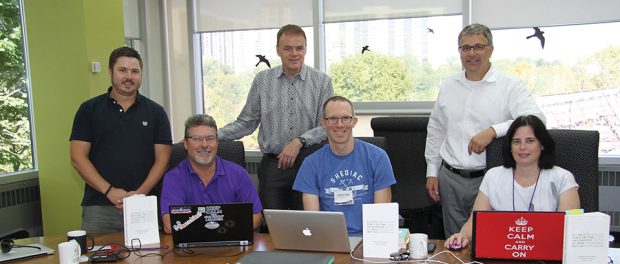Economic, social and climate justice
A new resource from OSSTF/FEESO for everyone!
 Members of the Economics and Climate Change Work Group break for a photo op while working in conjunction with Canadian economist Jim Stanford (L-R) Matt Giroux, D. 25; Kelly McCarthy, D. 20; Jim Stanford; Seth Bernstein, D. 12; Earl Burt, Provincial Executive liaison and Zoe Flatman, D. 12
Members of the Economics and Climate Change Work Group break for a photo op while working in conjunction with Canadian economist Jim Stanford (L-R) Matt Giroux, D. 25; Kelly McCarthy, D. 20; Jim Stanford; Seth Bernstein, D. 12; Earl Burt, Provincial Executive liaison and Zoe Flatman, D. 12
Two of the greatest emerging challenges of the future are entwined: our current economic system, and its consumption core, is fueling a climate crisis that may wipe out all of the uneven benefits that have been extracted by it. Can justice—social, economic and climate—be found within capitalism? If not, what might a system that meets these goals look like? And how can we engage our students most powerfully to get them ready for what lies ahead?
Although there is a clear gap in mandatory critical economic literacy curriculum at the high school level, many educators work to plug this gap in different areas of their practice. In 2016, the OSSTF/FEESO Provincial Executive sought to support those educators, and generate interest amongst others who might be inclined to engage, by tabling a motion at the Annual Meeting of the Provincial Assembly (AMPA) 2016. There, delegates voted to create a Work Group to “develop curriculum-related materials on the economics of finance and climate change from a social justice perspective that can be used in a number of subject areas in conjunction with the book, Economics for Everyone: A Short Guide to the Economics of Capitalism, by Jim Stanford.”
Jim Stanford is a Canadian economist and founder of the Progressive Economics Forum. He is currently an advisor to Canada’s largest private sector union, Unifor. Stanford wrote Economics For Everyone in 2008, with a revised edition in 2015. Stanford understands that economics, far from being the sole domain of experts well-versed in complex models incomprehensible to most, is most essentially a social science. Stanford writes, “The economy is too important to be left to the economists. Ordinary people have valuable economic knowledge—knowledge that’s usually ignored by the experts.”
Of course, a conceptual understanding of the history, tools and vernacular at play within capitalism can be invaluable for both assessing this system and visualizing an alternate one.
Once the motion passed at AMPA, the Economics and Climate Change Work Group set about to generate the resource. The Work Group consisted of four educators from across the province (Kelly McCarthy—District 20, Halton; Matt Giroux—District 25, Ottawa-Carleton; Zoe Flatman—District 12, Toronto and myself, Seth Bernstein, also from District 12), two members of the provincial staff (Rob Dubyk and Gary Fenn), and the Provincial Executive liaison, Treasurer Earl Burt, who was the originator of the idea to connect OSSTF/FEESO, Stanford, and the themes of economics and climate change. The Work Group met about 10 times over two years, recently wrapping up in time to have the resource ready for the 2018–19 school year. We had a chance to consult directly with Stanford a couple of times, enabling us to further map his conceptual ideas into the resource.
On a personal note, I was drawn to the project because I had been using Stanford’s book as a core text in an interdisciplinary Grade 12 Economic Justice course that I have been teaching for the past four years in Toronto. When designing the course, I selected Economics For Everyone because of its accessibility, its orientation around social justice, including Indigenous rights, and the fact that it is rooted in a critique of Canadian political economics and neoliberalism. It is a great entry point for students, and also provides the opportunity for rich, guided inquiry into more difficult
economic concepts.
Drawing on chapters 16–22 of Stanford’s book, the resource pulls Ministry curriculum expectations from a vast array of courses including Food and Nutrition Science, Construction Technology, the Sciences, Law, History, and of course, Business and Economics. It is designed to map onto the various needs of a classroom teacher; it provides stand-alone lessons, assignments that can be cherry-picked, or a unit plan within a course.
Activities include debating the impact of free trade policy in Canada on the economy and the environment. Students can also explore concepts of ethical investing by using a consensus model of decision-making to solve a pension crisis in the fictional community of Oiratno. Another assignment is built around a critique of Ontario’s 2016–2020 Climate Action Plan, including having the students conduct research that analyzes both the effectiveness of the plan and how well the government is meeting its targets. Still others revolve around learning about core macroeconomic topics like inflation and the monetary policy levers at the disposal of the Bank of Canada—students consolidate this learning by writing a letter to the bank advising it on future policy directions.
The resource also provides a visually-engaging, guided reading response for each of the Economics For Everyone chapters covered by the Work Group, along with a range of different handouts connected to key concepts. It is also packed with links to great readings, videos, and other connections for educators to incorporate into their respective courses.
Educators can first access the resource during Summer Leadership, where a workshop will be offered, and it will be made available on the provincial website in time for the start of the 2018–19 school year.
At its core, the resource was written in the same spirit as Stanford’s book. Economics is often intimidating not just for students, but for many educators, too—but it can be demystified easily—and made accessible for everyone. The more we break down the barriers for engagement, the better chance we have for a future built on foundations of economic, social and climate justice.

Leave a comment